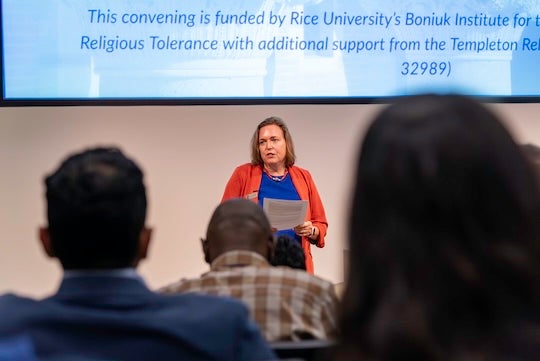Rice University’s Boniuk Institute for the Study and Advancement of Religious Tolerance held its first Spring Convening on Religious Pluralism and Conflict May 29-31 at the Rice BioScience Research Collaborative.
The inaugural convening included three days of panels examining current religious pluralism and conflict research and the future of the field, said Boniuk Associate Director of Research Kerby Goff in his opening remarks. Top scholars from 10 different nations and numerous disciplines came together to create a forward-looking research agenda to identify the why and how of pluralism and conflict.
Elaine Howard Ecklund, director of the Boniuk Institute and the Herbert S. Autrey Chair of Sociology, said she wants to further the cause of understanding the conditions that lead to religious pluralism and robust tolerance — as well as intolerance — to change lives and communities through interdisciplinary research.

By holding symposia and events that convene scholars from across disciplines, the Boniuk Institute aims to bring together the best knowledge, research methods and practices through “academic hospitality,” Ecklund said. Toward this end, the convening included a unique panel tactic: Instead of audience members asking panelists questions, the panelists posed questions to the audience to encourage robust conversation and interactive learning.
“We gather you all here because each of you has an interest in these critical topics, in particular religious pluralism and religious diversity,” Ecklund said. “Let me offer some working definitions of the two with the hope that you might reject or expand these definitions. Religious diversity is a ‘descriptive.’ It notes the presence of multiple religious perspectives, identities or groups within a context. Religious pluralism is an orientation or approach to religious diversity that takes religious differences seriously and wants to honor these differences while not necessarily agreeing with them and sees them as contributing to a healthy society for the common good. It will become apparent throughout our days together why we need to recognize these two concepts as distinct.”
Ramamoorthy Ramesh, executive vice president for research, explained how universities have a role in this conversation. As a research university, Rice utilizes interdisciplinary work to tackle topics that affect people and communities — a top priority for the administration.
“One needs to have a lot of tolerance, not just in religion but even in science,” Ramesh said. “Learn from each other. There’s a lot to be learned from every religion. There are lots of commonalities.”

Topics such as religious expression in the workplace, secular versus religious universities, the internet as a vehicle for both tolerance and intolerance and how religiosity affects health equity were examined over the three-day convening.
“We came together to discover more about what research already exists and what gaps there are that we can work toward addressing,” said Rachel Schneider, associate director of academic programs and director of the Boniuk Institute’s Religion and Public Life Program. “There are many different theologies, values and lifestyles in the world — how do we respect and protect one another while holding on to our own spiritual commitments? It was an incredibly productive three days, and I look forward to continuing these important conversations.”
The conference came to fruition out of the institute’s 10-year strategic plan unveiled October 2023. The plan includes multiple new programs and initiatives that will bring scholars together to make discoveries in the field and share their original research and scholarship with relevant local, national and global communities. The convening was held with support of the Templeton Religion Trust (award #TRT-2023-32989).
Learn about the Boniuk Institute’s upcoming programming here.

